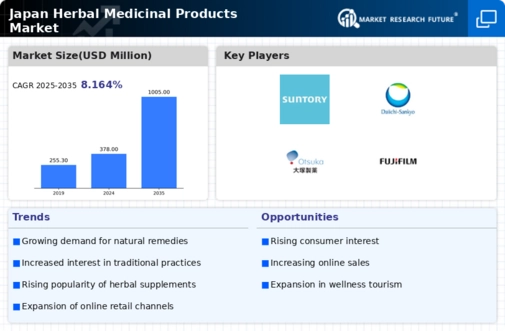Growing Consumer Awareness
In Japan, there is a notable increase in consumer awareness regarding health and wellness, which appears to be driving the herbal medicinal-products market. As individuals become more informed about the benefits of natural remedies, they are increasingly opting for herbal products over synthetic alternatives. This shift is reflected in market data, indicating that the herbal medicinal-products market has experienced a growth rate of approximately 8% annually. Consumers are actively seeking products that align with their health goals, leading to a surge in demand for herbal supplements and remedies. This trend suggests that the herbal medicinal-products market is likely to continue expanding as more people prioritize holistic health solutions.
Innovation in Product Development
Innovation within the herbal medicinal-products market is becoming increasingly vital as companies strive to meet evolving consumer preferences. In Japan, there is a growing trend towards the development of new formulations that combine traditional herbal ingredients with modern scientific research. This approach not only enhances the efficacy of products but also appeals to a broader audience. Market data suggests that innovative products, such as herbal teas and supplements, have seen a sales increase of 15% over the past year. This emphasis on innovation indicates that the herbal medicinal-products market is poised for continued growth as companies adapt to consumer demands.
Aging Population and Health Trends
Japan's demographic landscape, characterized by an aging population, significantly influences the herbal medicinal-products market. As the elderly population grows, there is a heightened focus on preventive healthcare and natural treatments. This demographic shift has led to an increased demand for herbal products that address common age-related health issues, such as joint pain and cognitive decline. Market analysis indicates that the herbal medicinal-products market is projected to reach ¥500 billion by 2027, driven by this demographic trend. The growing interest in maintaining health and vitality among older adults suggests a robust future for herbal remedies in Japan.
Cultural Acceptance of Herbal Medicine
The cultural acceptance of herbal medicine in Japan plays a crucial role in shaping the herbal medicinal-products market. Traditional practices, such as Kampo, which utilizes herbal formulations, have been integrated into modern healthcare. This acceptance fosters a favorable environment for the growth of herbal products, as consumers are more inclined to trust and utilize these remedies. Recent surveys indicate that approximately 60% of Japanese consumers have used herbal products at least once, highlighting the deep-rooted cultural affinity for natural solutions. This trend suggests that the herbal medicinal-products market will likely thrive as cultural practices continue to influence consumer choices.
Regulatory Framework and Quality Assurance
The regulatory framework surrounding herbal products in Japan is evolving, which has implications for the herbal medicinal-products market. Stricter quality assurance measures and safety regulations are being implemented to ensure consumer protection. This regulatory environment encourages manufacturers to adhere to high standards, thereby enhancing consumer trust in herbal products. As a result, the herbal medicinal-products market is likely to benefit from increased credibility and acceptance among consumers. Recent reports indicate that compliance with these regulations has led to a 20% increase in market participation from established companies, further solidifying the market's growth trajectory.















Leave a Comment